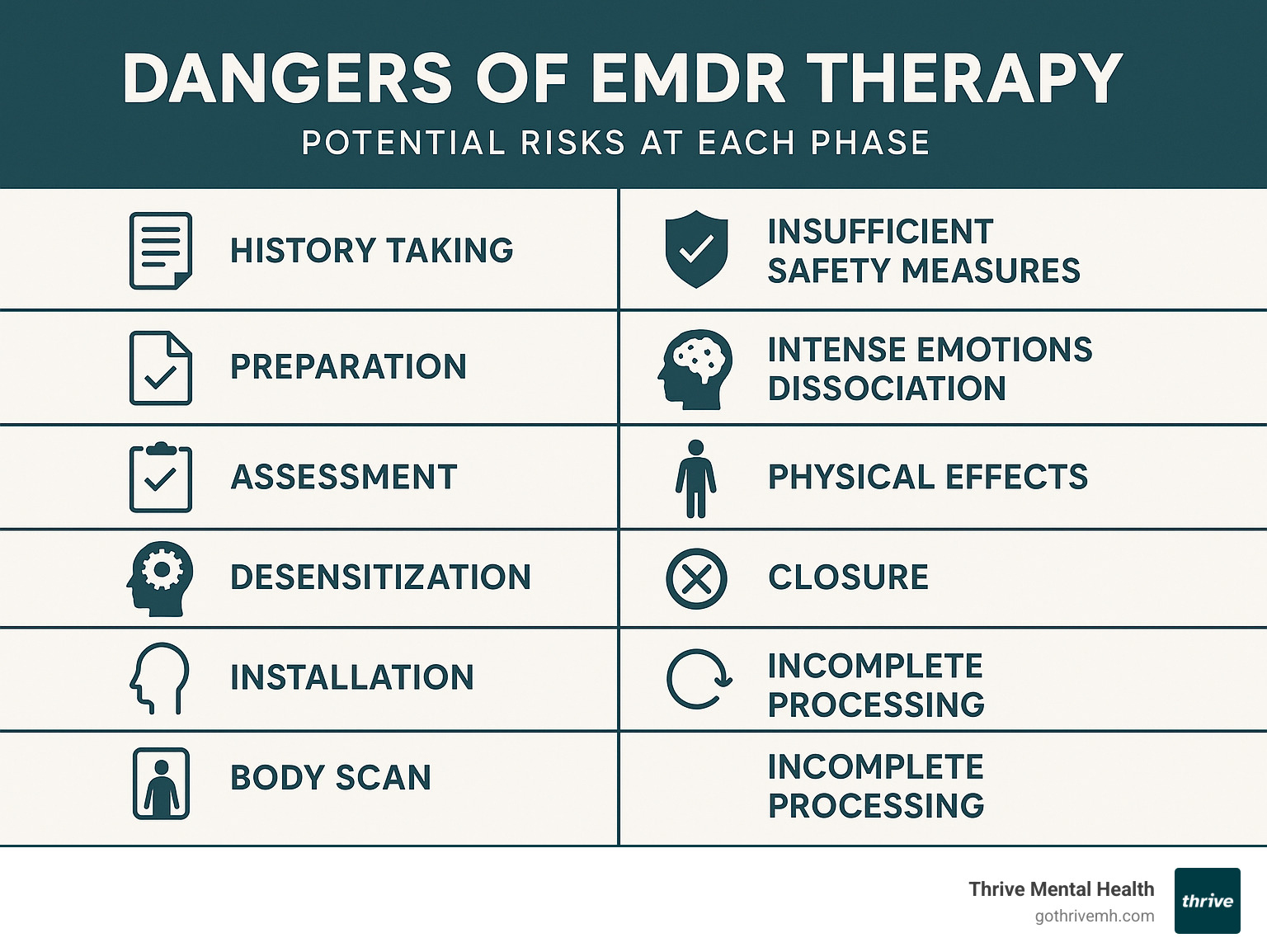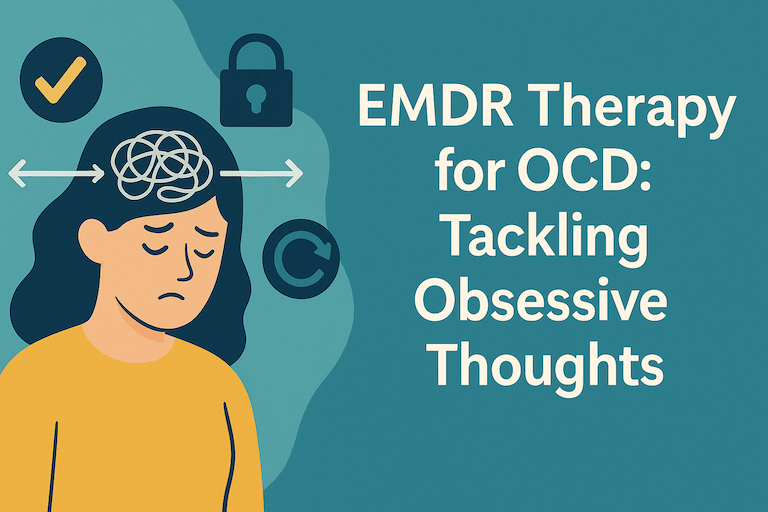EMDR therapy new york city stands out as a reliable approach
Recognizing EMDR Treatment: Exploring Its Advantages and Advantages for Psychological Wellness
EMDR treatment has actually become a remarkable method in the domain name of mental health, specifically for those grappling with trauma. Its organized technique of handling stressful memories sets it apart from conventional treatments. The prospective enhancements it supplies for numerous psychological difficulties necessitate closer exam. As people seek efficient solutions for their mental health, comprehending the nuances of EMDR may provide vital understandings into its applications and advantages. What lies below its restorative guarantee?
What Is EMDR Treatment?
Eye Motion Desensitization and Reprocessing (EMDR) treatment is a structured method made to alleviate the distress linked with distressing memories. Created by Francine Shapiro in the late 1980s, EMDR integrates components of cognitive-behavioral therapy with bilateral stimulation, typically through guided eye movements - emdr therapy new york city. The treatment aims to help people procedure and reframe terrible experiences, reducing their emotional charge and effect on life
During EMDR sessions, clients remember traumatic memories while concurrently participating in specific bilateral excitement techniques. This twin focus is thought to promote the mind's natural healing processes, enabling the integration of interrupted memories. EMDR is often used to treat problems like post-traumatic anxiety problem (PTSD), anxiety, and clinical depression. Its structured nature and versatile framework make EMDR easily accessible to a varied variety of clients, providing hope and alleviation from the worries of unresolved trauma.
The Scientific research Behind EMDR
Understanding the devices underlying EMDR therapy discloses an interesting interaction in between neurological actions and mental procedures. Study indicates that EMDR triggers the brain's information handling system, facilitating the combination of distressing memories. This procedure appears to involve the bilateral stimulation generally used in EMDR, which can aid re-shape neural pathways associated with stressful experiences.
Researches have actually revealed adjustments in brain task patterns during EMDR sessions, especially in areas connected to psychological regulation, such as the amygdala and prefrontal cortex. These changes recommend that EMDR may minimize the psychological charge of stressful memories, therefore enabling people to refine their experiences much more adaptively.
Furthermore, neuroimaging research studies highlight changes in the default mode network, which might play a role in exactly how people connect to their memories. Generally, the scientific expedition of EMDR underscores its possible effectiveness in advertising psychological wellness via an intricate interaction of cognitive and neurological mechanisms.
Just How EMDR Works: The Process Explained
While numerous therapeutic strategies focus on spoken handling, EMDR utilizes a distinct method that integrates reciprocal excitement to assist in recovery. The process begins with the specialist assisting the customer identify upsetting memories or thoughts. Once these targets are established, the therapist guides the customer through a collection of eye movements or other forms of reciprocal stimulation, such as tapping or auditory signs. This stimulation is believed to aid in refining the memories, enabling the brain to recycle distressing experiences a lot more adaptively.
Throughout the sessions, clients may experience a variety of feelings and understandings as they confront their memories. The therapist maintains a helpful environment, making sure the client really feels safe during the procedure. After the excitement, the therapist helps the client review any kind of modifications in their thoughts or feelings concerning the targeted memories. This organized method aims to lower the emotional charge associated with injury, advertising a much healthier psychological state.
Advantages of EMDR for Injury Healing
EMDR therapy provides considerable advantages for individuals recuperating from injury. It facilitates an accelerated healing process, aiding customers process distressing memories a lot more successfully. Additionally, it reduces emotional distress and improves coping abilities, encouraging people to manage their experiences more successfully.
Accelerated Healing Refine
As individuals look for efficient methods for overcoming trauma, the increased recovery process offered by EMDR treatment stands out as a transformative strategy. Unlike conventional restorative strategies that may take years to generate outcomes, EMDR assists in rapid handling of distressing memories. This technique enables customers to challenge and integrate uncomfortable experiences in a structured manner, often bring about breakthroughs within a few sessions. The reciprocal excitement fundamental in EMDR helps to desensitize individuals to distressing memories, promoting a sense of safety and security and control. Customers regularly report substantial reductions in trauma-related symptoms. By speeding up the healing journey, EMDR encourages people to redeem their lives and move onward with restored durability and hope, making it a valuable alternative for trauma recovery.
Decreased Psychological Distress
Psychological alleviation comes to be achievable through the application of EMDR therapy in trauma recuperation. This therapeutic method facilitates the processing of stressful memories, which usually add to overwhelming psychological distress. By making use of bilateral stimulation, EMDR makes it possible for clients to accessibility and reframe traumatic experiences, minimizing their emotional fee. As people involve with their memories in a risk-free setting, they may experience a considerable decline in clinical depression, worry, and anxiousness connected with previous injuries. Furthermore, EMDR advertises a sense of security and empowerment, allowing individuals to confront their feelings without becoming overloaded. Therefore, clients typically report an improved mood, promoting strength and an extra balanced perspective on their lives. This reduction in emotional distress is a vital benefit of EMDR treatment.
Improved Coping Abilities
While trauma can leave people really feeling vulnerable, EMDR treatment equips them with improved coping skills that help with resilience and individual development. By dealing with the root causes of distress, EMDR assists customers recognize and create efficient strategies to manage their emotional reactions. These dealing abilities consist of mindfulness, grounding techniques, and psychological guideline, which empower people to browse challenging scenarios with better ease. As customers advance through EMDR therapy, they find out to reprocess distressing memories, changing their perceptions and lowering sensations of anxiety and vulnerability. This newfound capacity to cope not only help in trauma healing however likewise boosts general psychological health, causing enhanced relationships and a more meeting life. Ultimately, EMDR cultivates a sense of agency that sustains long-term psychological health.
EMDR and Its Performance for Anxiety and Clinical depression
EMDR therapy runs on the concept of reciprocal stimulation, which might aid individuals procedure and reframe traumatic memories linked to anxiety and depression. Research indicates promising medical success rates, recommending that EMDR can be an efficient treatment for these psychological health and wellness conditions. Recognizing the underlying devices and end results of EMDR gives understanding right into its therapeutic potential.
System of EMDR
Various studies have actually hop over to these guys demonstrated the efficiency of you can try here Eye Motion Desensitization and Reprocessing (EMDR) therapy in dealing with anxiety and clinical depression. The system of EMDR involves bilateral stimulation, commonly with led eye motions, which promotes the processing of stressful memories. This double interest enables individuals to reprocess terrible experiences while keeping a concentrate on today, reducing emotional disruption. EMDR aims to integrate fragmented memories, decreasing their unfavorable psychological influence. Via structured phases, the treatment assists clients reframe their assumptions, promoting adaptive beliefs about themselves. This procedure not only relieves symptoms of anxiousness and anxiety however also improves psychological policy, leading to enhanced psychological health. On the whole, EMDR's special strategy offers a thorough structure for healing mental distress.

Medical Success Rates
Research suggests that EMDR therapy has revealed amazing success prices in easing symptoms of stress and anxiety and anxiety. Various researches have demonstrated that individuals undergoing EMDR often experience substantial reductions in traumatic signs within a fairly brief duration. A meta-analysis revealed that EMDR is as reliable as typical cognitive-behavioral treatment for treating both stress and anxiety and depression. On top of that, some patients report renovations after simply a few sessions. EMDR's effectiveness is credited to its distinct technique, which aids recycle traumatic memories, resulting in lowered psychological distress. Patients often share high contentment with their therapy outcomes, keeping in mind improved emotional regulation and overall health. This proof supports EMDR's growing recognition as a valuable restorative option for mental health and wellness specialists.
Locating an EMDR Therapist: What to Consider
When searching for an EMDR therapist, what crucial aspects should one take into consideration to guarantee a great fit? First, it is vital to verify the specialist's qualifications and certifications, guaranteeing they are trained particularly in EMDR therapy. This training should be backed by recognized certifications from respectable companies
Next off, take into consideration the specialist's experience, specifically with instances comparable to one's own. Various therapists may have varying areas of emphasis and expertise, which can significantly impact the therapeutic procedure.
One more essential aspect is the specialist's approach and style. A great rapport and comfort level between the customer and specialist are vital for efficient therapy.
Furthermore, practical factors to consider such as schedule, session, and area costs must not be ignored. By thoroughly reviewing these aspects, individuals can make informed choices in their quest of EMDR therapy, enhancing their chances for effective psychological wellness results.
Regularly Asked Concerns
Can EMDR Treatment Be Utilized for Kids and Teens?
Yes, EMDR therapy can be successfully used for adolescents and children. Research study indicates that it assists in refining terrible experiences, assisting younger people develop coping techniques and improve emotional guideline in a helpful setting.
How much time Does an EMDR Therapy Session Generally Last?
An EMDR treatment session generally lasts in between 60 to 90 mins. The duration may Visit This Link differ based on individual requirements and restorative objectives, guaranteeing that each session effectively addresses the customer's specific experiences and challenges.
Is EMDR Treatment Covered by Insurance Plans?
EMDR therapy protection differs by insurance policy plan. Some strategies include it as part of mental wellness advantages, while others may require specific standards to be fulfilled. People need to consult their insurance policy service provider for detailed info.
Are There Any Type Of Side Impacts of EMDR Treatment?

The Number Of Procedure of EMDR Treatment Are Normally Needed?
Typically, individuals might call for anywhere from six to twelve sessions of EMDR treatment, depending upon the intricacy of their injury and individual progress (emdr therapy new york city). Some may require added sessions for much deeper problems or continuous support
Eye Motion Desensitization and Reprocessing (EMDR) therapy is an organized technique designed to ease the distress linked with terrible memories. Emotional alleviation becomes possible through the application of EMDR therapy in injury recuperation. As clients progress with EMDR treatment, they learn to recycle distressing memories, transforming their understandings and minimizing feelings of anxiousness and vulnerability. EMDR therapy operates on the principle of bilateral stimulation, which may assist people procedure and reframe distressing memories linked to anxiousness and anxiety. EMDR treatment might lead to temporary side impacts such as boosted emotional distress, vibrant memories, or physical discomfort during sessions.